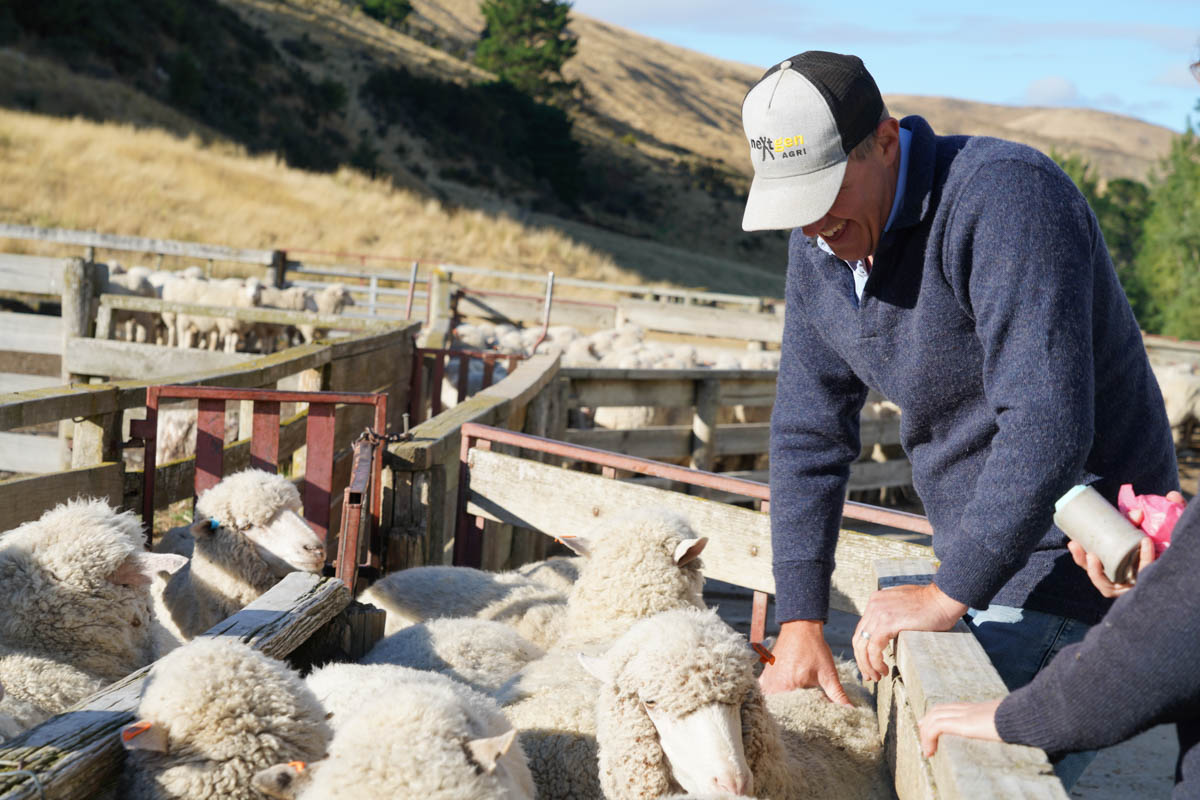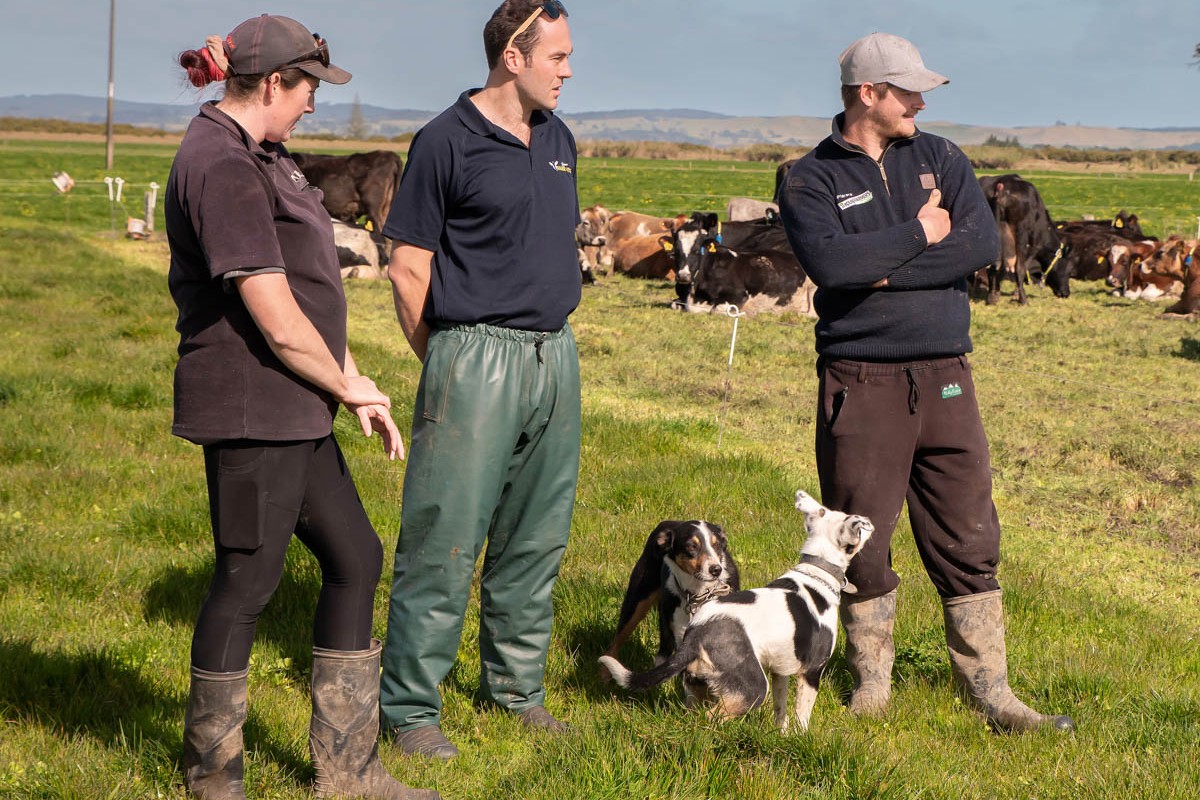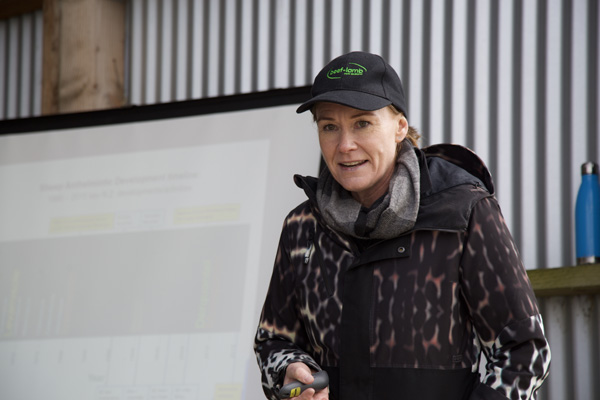Focused farmer determined to win
An almost fatal battle with cancer hasn’t stopped West Otago farm manager Shaun Bradley. Story by Terry Brosnahan. Photos by Chris Sullivan.
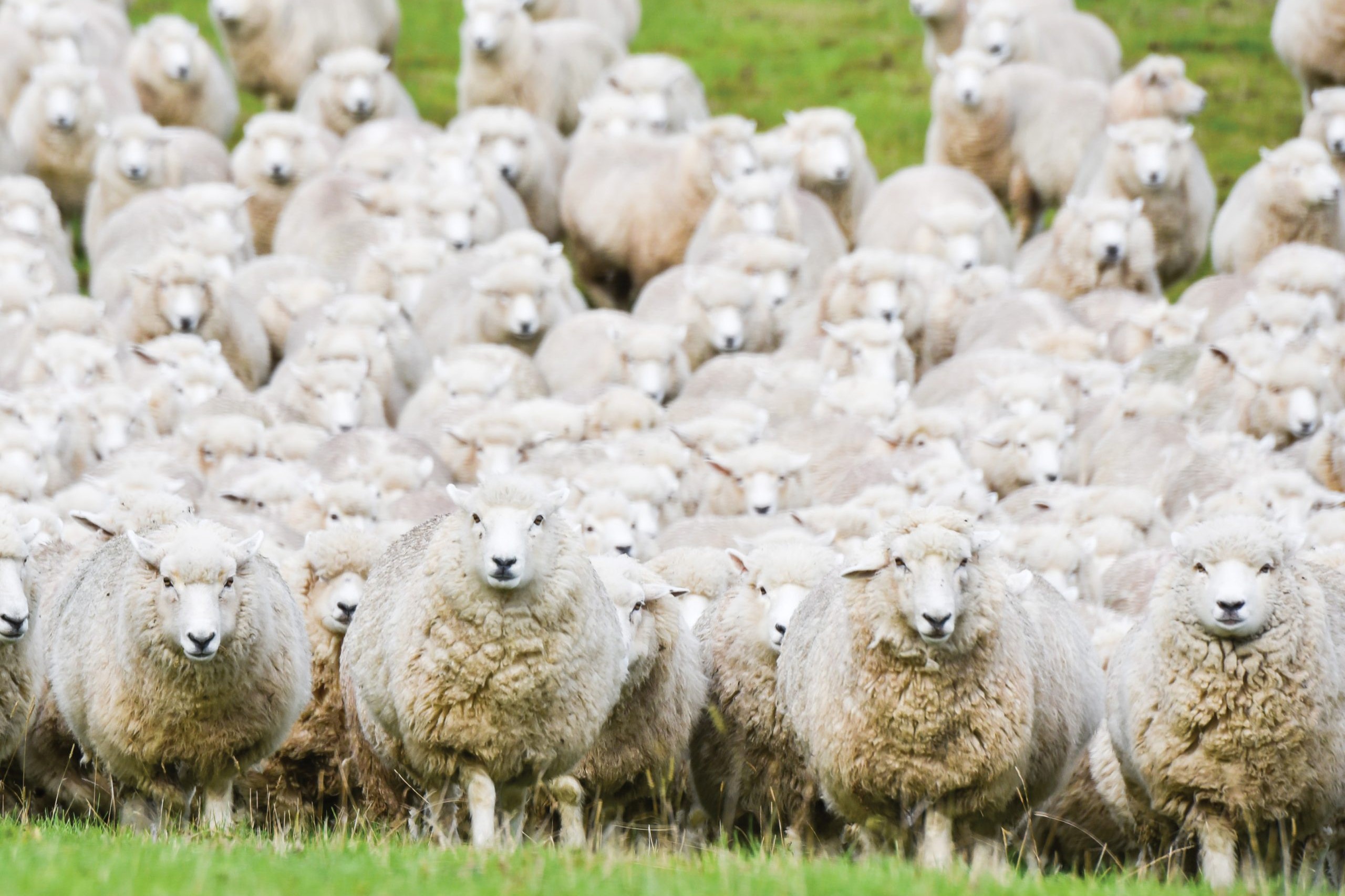
Otago farm manager Shaun Bradley has a smile on his face and it is with good reason.
It might be because he recently won several local sheep competitions, but more likely it’s because he won his recent battles with cancer and is enjoying life.
The 29-year-old Tapanui farm manager won the 2021 Country-Wide West Otago two-tooth competition and $500.
Shaun also won the ewe hogget competition and went on to come second in the regional final to Jeff Farm, South Otago.
He is managing Kowai Downs, a 530ha (500ha effective) farm owned by Fiona and Nelson Hancox. He started working for the Hancoxes in August 2018.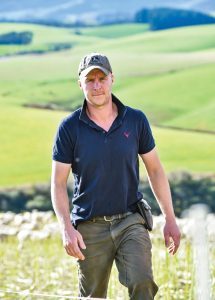
The family own three farms, Mt Allen, Wohelo and Kowai Downs which are run as separate companies. Mt Allen is managed by Julian Kelly who won the large flock section.
The farm managers are competitive and the two wins will give Shaun bragging rights for a while.
Shaun’s wins are amazing achievements considering he had fought off cancer and didn’t have long to prepare the flocks.
He had only entered the two-tooth competition the first time in 2019 and the competition was cancelled last year due to Covid-19. Shaun was busy battling blood cancer through 2019 and part of 2020, diagnosed with stage four B cell non-Hodgkin’s followed by a secondary brain tumour.
He and his wife Olivia (28) had only been married just over a year and were expecting their first baby. Olivia ended up becoming a new mum and advocate for Shaun’s access to treatment.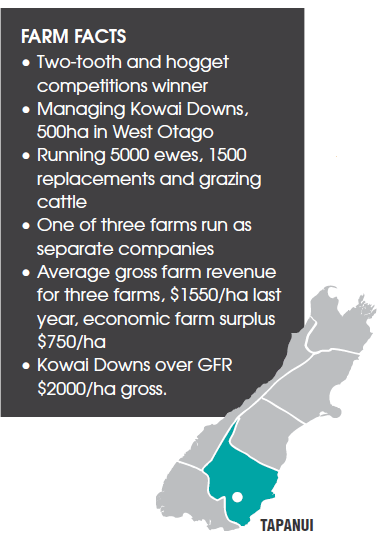
It was a tough time for the pair, but they fought hard and had strong support from the Hancoxes, family and the community. Shaun is now in remission and has been back running the farm for a year.
Nelson says Shaun is incredibly focused, and it is his mental strength and stubbornness that is a major reason why he is alive today.
Golden touch
Shaun didn’t grow up on a farm but he has worked for some good mentors. They include progressive North Canterbury farmers and brothers, Mark and Sam Zino, and now Nelson.
He says Nelson has given him a lot of guidance on stock handling, especially selecting replacements and rams.
“Nelson taught me once they have lambed, give them space, open the gates up.”
This winter the farm is running 5000 Romney ewes and 1500 replacements. There are also 8 R2 cattle remaining from 90 grazed.
One of the two-tooth competition judges commented on how healthy and golden looking Kowai’s sheep were.
Shaun says with the correct feeding, fertiliser and minerals applied to the soil and by following animal health procedures any stock can be made to look good within a year.
“Lucky it was a nice day for the judging.”
He says having stock in good condition and healthy was the whole aim of farming. Lambing hoggets have to be fed exceptionally well, maintain a good condition score and get back to two tooth mating weight as soon as possible. A lot of farmers think it is too hard on them.
“Those who don’t lamb tend to push them to the side during winter on little feed.”
Shaun says by lambing hoggets they can afford to carry less ewes and put more feed into them.
The sheep are set stocked in each paddock but after lambing they have the run of 4-5 paddocks to get more shelter, a mix of new and old grass.
His recipe to growing good replacements is genetics and good feeding. Selection is tough. He is constantly going through them.
“When you get them in for drenching you look through them and take a few more out.”
Out of the 2300 ewe lambs available on Kowai to select from, only 1500 are selected as replacements to go to the ram. They are chosen by weight, constitution and condition score. Anything too small is not put to the ram.
He will cull about four times before mating. If they don’t measure up to the cut-off of a condition score of three, they don’t go to the ram. The hoggets usually weigh between 44-55kg at mating and are mated with Cheviot rams. If the two-tooths don’t measure up they go into the ewe B mob to be mated with the blackface rams. This year 150 went to the B mob. Romney rams go over the A mob.
Buying top genetics
Teaser rams only go out to the hoggets for 34 days and last year the hoggets (to the ram) lambed 103%, a first for Shaun.
Nelson buys the top genetics from four North Island studs – Wai-iti, Hildreth, Te Whangai and Wairere.
He keeps the two-tooths separate right up until after lambing. That depends on where the best feed is and how hectic it is.
“I like to see how they lamb.”
The two-tooths are mixed with older ewes at tailing so the lambing percentage is not known but the overall figure for the ewes is 148%.
Shaun says ideally it would be good to lamb them completely separate and use the lambs as replacements for faster genetic gain through the flock, however that isn’t possible because there aren’t enough replacements.
Weaning is in the middle of December and last year the farm produced 8750 lambs. A lot of the lambs kill out at 16.5-18kg carcaseweight. The mean kill date is the end of February. Hoggets start lambing at Labour Weekend. This year most of the 1400 hogget lambs were sold store under contract into Canterbury.
Dry hits feed crops
The drive into Kowai Downs in early May told the story of what was happening climate-wise.
Swede crops were parched. Crops which had struck had grown well, but the weather turned dry and had only received 30-40% of their usual rainfall.
Nelson, as managing director of the 3336ha, is in charge of all development such as fencing, drainage and buildings. He and his son Mitchell are in charge of the agronomy and together they do about 90% of the tractor work.
About 250ha of brassica and 150ha of young grass is grown.
Young crops are inspected regularly by walking well into the paddock and if necessary, they will apply the appropriate control.
A paddock of Sovereign Gold kale was grazed off early this year due to Nysius fly attacks which ring-barks the stem and weakens it.
Nelson says they had been reducing the rate of insecticide for environmental reasons and had gone a week too late when the plants were about 10mm when it should be more 3-4mm.
With it eaten off early, the paddock was able to be put into permanent pasture, with minimum tillage in the autumn.
“Now we are just waiting for the rain.”
Shaun says because they don’t normally feed out during the winter there is little compaction on the soil from wheel marks.
The farms share gear, tractors, implements and inputs like fertiliser, seed and fencing materials which Nelson buys in bulk. Those costs are apportioned between the three farms on a stock unit basis, 40:40:20.
The average gross revenue for the three farms was $1550/ha last year, and the economic farm surplus $750/ha. (Kowai Downs over $2000/ha gross). Nelson expects it will be similar this year.
Thistle killing success
Shaun says wiping and killing Californian thistles is a cheap way to gain extra feed.
Instead of topping the calis, he uses a wiper towing it around the paddocks with a bigger tank on the truck to refill.
There was an unused weed wiper sitting in the shed when he arrived. It took him weeks trialling different rates and speeds to find the most efficient system. He started wiping in October last year and managed 250ha but ran out of time so he topped the rest.
The difference is stark. Paddocks which have been wiped were clean whereas in the topped paddock, the calis had come back.
Shaun found once calis are mature enough wiping is effective throughout the summer.
They are wiped when they are high enough so the grass is not hit and there is enough of them to make it worthwhile.
A flatbed truck which Shaun modified has a 500L tank of water on the back so he can fill up the 60L tank on the wiper
Handy on the tools
Shaun is the type of employee any farmer would love to have. Not only is he innovative, and a good stockman, he’s handy with a hammer or a wrench.
After he left school, Shaun worked for a local contractor William Kirk who serviced all his own gear. He learned skills and does a lot of mechanical work though one of the Hancox’s four children, Mitchell is the mechanic and tractor driver for the three farms. Elliot, the middle son, is shepherd general between the farms and Tom, the youngest works on Argyle station, after completing Lincoln University.
Shaun drives around in a modified Toyota Surf which he bought for $2000 and turned into a flat deck truck. The back wall and deck were cut out of an old single cab.
Shaun’s advice to farmers fixing their own machinery is to invest in a $3000 hoist especially if they are doing a lot of repairs. Far easier and quicker.
He is also a useful builder and plumber, and does a lot of building work around the farm.
Both Shaun and Olivia are very practical and big on common sense. Olivia, who is an early childhood teacher, helped Shaun out on the farm while he was recovering.
When Shaun was younger he learned about feed budgeting and management from completing Dip Ag papers from Lincoln University while working on a dairy farm at Darfield. Shaun worked during the day and studied at night.
“Studying while working huge days was incredibly challenging”.
He also completed papers through Ag ITO.
Shaun says after 10 years farming this is the best position he’s been in. Nelson has given him the scope to try out his own ideas.
“He’s given me the chance to do it all.”
Cancer strikes
In early 2019 Shaun started to feel tired, he was vomiting at night and collapsing. He kept going to the Southern District Health Board (SDHB) doctors in Gore, but it was misdiagnosis after misdiagnosis.
Unable to find anything in his blood tests, they put it down to sinus infection, a pulled back muscle and pneumonia. He kept passing out and at one point he told a doctor he felt like he was dying.
Shaun carried on trying to work but the blackouts continued. He lost about 10kg over three weeks, he was skin and bones.
Finally after a conversation with a relatable doctor, he was checked out. They found a 15cm tumour around his heart and top of his lungs which had spread to his lungs, pancreas and kidneys.
He had six months of chemotherapy, most of it in hospital.
Olivia was a strong advocate for Shaun during his treatment and became the squeaky wheel. She still didn’t get any apology from the SDHB.
Shaun is obviously a man who doesn’t like to sit still so it wasn’t easy lying in a hospital bed. He struggled but kept busy with tasks like planning the rebuild of a Toyota Hilux truck which is in progress now.
“I never watched TV as it pissed me off, so I researched stuff.”
When he was out of hospital and recovering at home he just couldn’t keep away from the workshop.
He had about 10 chairs around a vehicle and would move from chair to chair working on it.
“I just sat there doing the things I would usually do standing.”
Shaun thought he was cured, but as he was fixing farm gear, he had a terrible pain in his head and collapsed. The cancer had spread to his brain and a tumour the size of a golf ball had grown within a week.
Shaun had to undergo more toxic chemo and a bone marrow transplant. He was told if it didn’t work he would be dead within a week.
“It’s been a ride.”
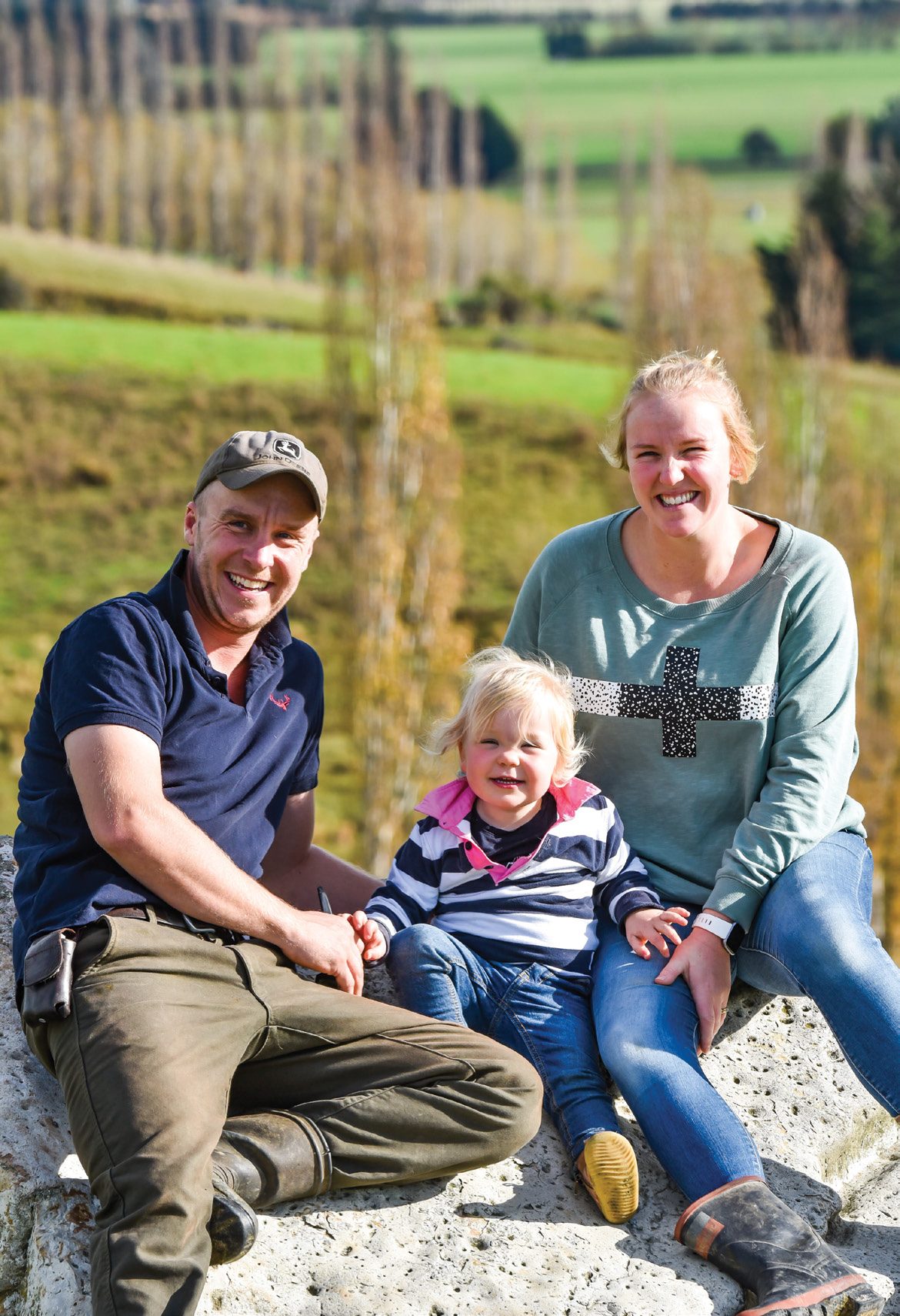
Shorn the sheep
The cancer fight drained Olivia and Shaun, mentally and financially. They didn’t have medical insurance and getting on the dole was difficult. Even though they are used to filing complicated forms, dealing with bureaucracy was a nightmare.
The Bradleys say Fiona and Nelson Hancox have been great employers and treated them like family. The house was free and they offered to pay his wages while sick but Shaun refused it.
The Bradleys spent most of their savings, but the community fundraised $50,000 for them.
Fiona and Nelson put up their lambs to be shorn in the 24-hour Shear-a-thon organised by the Hancoxes and Jared Manihera, a PGG Wrightson wool agent. The money the family would have paid a contractor went to the fundraiser.
Four shearers shore for 24 hours with Eru Weeds shearing 1385, Cole Wells, 930; Matt Hunt, 877 and Dave Gower, 564. There were numerous other support shearers and rousies. In total they shore 7280 lambs and along with $10,000 from a stock drive, $50,000 was raised.
When Shaun walked into the shed and saw about 350 people, most he hardly knew who had turned up to support him, he was completely blown away.
“They were willing him to live,” Nelson says.
As well as the fundraiser, friends started a Givealittle page which raised $20,000.
They have had to put on hold their original plan of leasing land while Shaun managed Kowai Downs, until they recover from the cancer battles.
Shaun had only been working six months for the family when he started slowing down with the cancer and was off work from April 2019 until April 2020.
Nelson says he would have persevered with anyone battling what Shaun had, but “Olivia and Shaun are bloody cool people.”
He says not many people can plumb, engineer and be a great stockman. Olivia always has a beaming smile on her face even during bad times, and Charlotte brings a smile to everyone.
Despite their torrid time with cancer the couple remain positive and are getting on with life.

